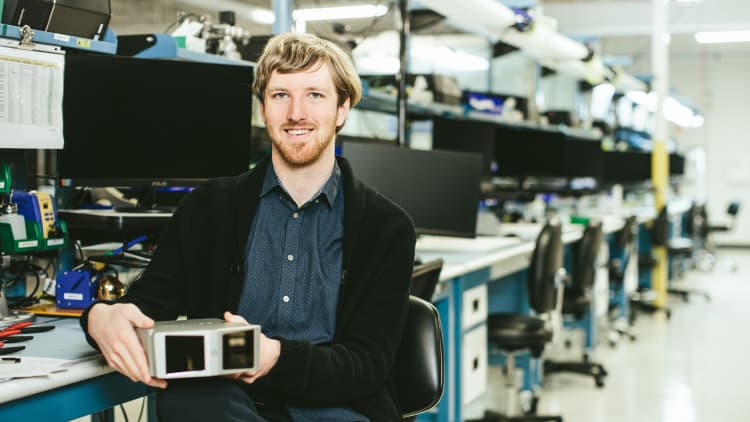Elon Musk says Tesla vehicles one day make money for their owners by autonomously transporting people when their owners are not using them — like a driverless Uber or Lyft ride.
Teslas already have the hardware they would need built in.
For example, there's a small camera above the rear view mirror of Teslas meant to eventually give users a way to watch what happens inside their car when they are not in it.
It's "there for when we start competing with Uber/Lyft & people allow their car to earn money for them as part of the Tesla shared autonomy fleet. In case someone messes up your car, you can check the video," Musk Tweeted Thursday.
"It's hard to wrap my head around a future where my car might be earning me money through autonomous driving while I'm asleep in my bed or play video games but here we are," German professional e-sports player Marcel "Dexter" Feldkamp tweeted back.
That reality is "...just a matter of finishing the software & going through regulatory approval," Musk tweeted.
And eventually, "Instead of someone needing to drive their car personally, they can manage a fleet of self-driving cars," Musk says.
Currently, Tesla has autopilot function which includes following features: "match speed to traffic conditions, keep within a lane, automatically change lanes without requiring driver input, transition from one freeway to another, exit the freeway when your destination is near, self-park when near a parking spot and be summoned to and from your garage," according to the Tesla website. However, the autopilot features require the driver to be actively supervising the car.
All Tesla vehicles are built with the hardware capable of "full self-driving capabilities," says the website. The hardware, however, is not useful until it has been activated with appropriate software updates. And Tesla will not be able to activate such software until "billions of miles of experience" have proven the features to be safer than humans and regulatory approval has been received, according to the site.
When the self-driving software is fully deployed, Tesla claims users will be able to get in the car and tell it where you need to go.
"Your Tesla will figure out the optimal route, navigate urban streets (even without lane markings), manage complex intersections with traffic lights, stop signs and roundabouts, and handle densely packed freeways with cars moving at high speed. When you arrive at your destination, simply step out at the entrance and your car will enter park seek mode, automatically search for a spot and park itself. A tap on your phone summons it back to you," Tesla says on its website.
Musk also mentioned the Uber-like business model during Tesla's third-quarter earnings conference call in October: "Tesla will operate its own ride-hailing services and compete directly with Uber and Lyft, obviously," he said, according to CNBC.
Lyft, which went public in March, is already actively involved in autonomous car technology.
In August, Lyft said it had completed more than 5,000 self-driving rides through its app. By January, that number had climbed north of 30,000. The autonomous driving system used for these first 5,000 rides was not built by Lyft, but by the auto-parts supplier Aptiv Plc with which it partnered, according to Reuters. In October, Lyft acquired the London-based augmented reality startup Blue Vision Labs to advance its self-driving ambitions, TechCrunch says.
When reached for comment, a spokesperson for Lyft pointed CNBC Make It to Lyft co-founder and President John Zimmer's 2016 Medium post: "Elon is right that a network of vehicles is critical, but the transition to an autonomous future will not occur primarily through individually owned cars. It will be both more practical and appealing to access autonomous vehicles when they are part of Lyft's networked fleet."
Tesla and Uber did not immediately respond to CNBC Make It's request for comment.
However, about a year ago, Uber's CEO Dara Khosrowshahi confirmed the companies interest in self-driving technology. "[W]e are absolutely committed to self-driving cars," Uber CEO Dara Khosrowshahi told Savannah Guthrie, co-host of NBC's "The Today Show," during an interview which aired in April 2018. "This is an important technology," Khosrowshahi said.
See also:
Tesla 'obviously' plans to take on Uber and Lyft, says CEO Elon Musk
Uber's CEO: 'We are absolutely committed to self-driving cars'
This 23-year-old founded a company with self-driving car tech that's giving Tesla some competition

Like this story? Subscribe to CNBC Make It on YouTube!
Correction: This story has been revised to correct that Lyft went public in March. It has also been updated to include the number of self-driving rides Lyft had completed by January.


